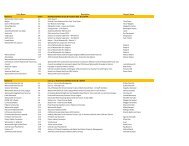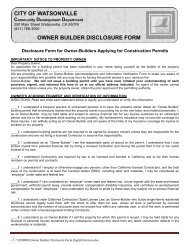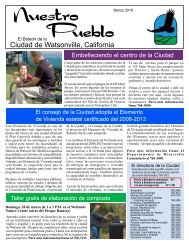agenda city of watsonville city council/redevelopment agency meeting
agenda city of watsonville city council/redevelopment agency meeting
agenda city of watsonville city council/redevelopment agency meeting
You also want an ePaper? Increase the reach of your titles
YUMPU automatically turns print PDFs into web optimized ePapers that Google loves.
This Fund Balance Policy establishes the procedures for reporting unrestricted fund<br />
balance in the General Fund financial statements. Certain commitments and<br />
assignments <strong>of</strong> fund balance will help ensure that there will be adequate financial<br />
resources to protect the City against unforeseen circumstances and events such as<br />
revenue shortfalls and unanticipated expenditures. The policy also authorizes and<br />
directs the Finance Director to prepare financial reports which accurately categorize<br />
fund balance as per Governmental Accounting Standards Board (GASB) released<br />
Statement 54 -"Fund Balance Reporting and Governmental Fund Type Definitions".<br />
This new Statement is intended to improve the usefulness <strong>of</strong> the amount reported in<br />
fund balance by providing more structured classification. This Statement applies to fund<br />
balance reported in the General Fund, Special Revenue Fund, Debt Service Fund,<br />
Capital Projects Fund and Permanent Fund. This Statement does not apply to<br />
Enterprise Funds, Internal Service Funds, and extremely restricted reserves.<br />
Procedures<br />
Fund balance is essentially the difference between the assets and liabilities reported in<br />
a governmental fund. There are five separate components <strong>of</strong> fund balance, each <strong>of</strong><br />
which identifies the extent to which the City is bound to honor constraints on the specific<br />
purposes for which amounts can be spent.<br />
Non-spendable Fund balance includes amounts not in spendable form, such as<br />
inventory, or amounts required to be maintained intact legally or contractually<br />
(principal endowment) (e,g, inventory, pre-paid items, permanent scholarships).<br />
Restricted Fund Balance includes amounts constrained for a specific purpose by<br />
external parties (e.g. Charter Reserve, Insurance Reserve, Debt Service, Capital<br />
Projects, State and Federal Grants).<br />
Committed Fund Balance includes amounts constrained for a specific purpose by<br />
a government using its highest level <strong>of</strong> decision making authority (e.g. Major<br />
Maintenance, Capital Replacement Reserve, Emergency Reserves).<br />
Assigned Fund Balance includes general fund amounts constrained for a specific<br />
purpose by a governing board or by an <strong>of</strong>ficial that has been delegated authority to<br />
assign amounts.<br />
Unassigned Fund Balance is the residual classification for the general fund.<br />
The first two components listed above are not addressed in this policy due to the nature<br />
<strong>of</strong> their restrictions. An example <strong>of</strong> nonspendable fund balance is inventory. Restricted<br />
fund balance is either imposed by law or constrained by grantors, contributors, or laws<br />
or regulations or governments. This policy is focused on financial reporting <strong>of</strong><br />
unrestricted fund balance, or the last three components listed above. These three<br />
components are further defined in the following section.<br />
Committed Fund Balance. The City Council, as the City’s highest level <strong>of</strong> decisionmaking<br />
authority, may commit fund balance for specific purposes pursuant to<br />
constraints imposed by formal actions taken, such as an ordinance or resolution. These<br />
committed amounts cannot be used for any other purpose unless the City Council<br />
Exhibit “A”<br />
Page 1 <strong>of</strong> 2
















